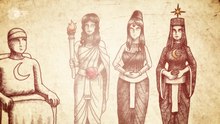Hubal
Hubal ( Arabic هبل, DMG Hubal ) was an important astral deity of the Arab tribe Quraisch , the ruling tribe of Mecca , whose statue made of red carnelian stood in the Kaaba .
The Chuzāʿite ʿAmr ibn Luhaiy reportedly brought the statue back with him from one of his many trips to Mecca. ʿAmr ibn Luhaiy bathed in a spring and was cured of a serious illness afterwards. So he took the image of Hubal with him to Mecca. The exact location from which it came is not known. However, there are two theories: either Hīt in present-day Iraq or Maʾāb in Jordan . At its place of origin, Hubal was one of several lords ( arbāb ) who were worshiped there. Hubal was later shown " humanized " and with a shortened right arm. He was also famous for his oracles . On important occasions his seven oracles were consulted. In addition, after returning from a trip, a Meccan first went to Hubal to offer him a sacrifice.
Islamic historiography depicts the rich Amr ibn Luhaiy, who brought Hubal to Mecca, as the one under whom the cult of the Kaaba has degenerated. Tilman Nagel suspects that the Quraish held this view even before Muhammad appeared as a prophet.
After Muhammad was born, according to Ibn Ishāq, his grandfather ʿAbd al-Muttalib ibn Hāschim went with the infant into the Kaaba to offer it to the god Hubal. However, other Islamic sources say that ʿAbd al-Muttalib dedicated the newborn to Allaah . The Hanif Zaid ibn 'Amr, a contemporary of Muhammad, who had been expelled because of his views from Mecca, a poem is attributed, in which he treats among others the worship Hubals:
“ I remove both al-Lāt and al-ʿUzzā ; so acts the strong, persevering! I do not worship al-ʿUzzā or their two daughters; I do not seek out the two idols of the Banū ʾAmr, neither do Hubal , who has been a master to us since time immemorial - my prudent caution is too little (to allow myself to be dissuaded from my belief in one God)! Instead, I am amazed: How many things astonish you in the nights and in the days, things that the sharp-eyed recognizes! (He sees) that Allah destroyed many men who were engaged in wrongdoing; that he let others live for the sake of the piety of some people, so that the child of the wicked grew up - and while one had calmed down (about Allah's possible vengeance), the latter returned one day, like the branch soaked by the rain suddenly turning green. But I adore the Merciful, my Lord, that the forgiver may forgive my transgressions. Therefore keep your fear of Allah your Lord! As long as you keep it you will not perish. You see, the abode of the upright are the gardens; for the ungrateful (Arabic: Pl. al-kuffār), however, the heat of hellfire and a dishonor in (this-worldly) life await, and when they die, they encounter what makes the heart uneasy. "
After conquering Mecca, Muhammad consecrated the Kaaba to Allaah alone and removed the statues from the sanctuary.
literature
- T. Fahd: Hubal. In: The Encyclopaedia of Islam . 2nd edition, Vol. 3, Brill, Leiden 1986, p. 536.
- Tilman Nagel: Mohammed: Life and Legend. R. Oldenbourg Verlag, Munich 2008.
